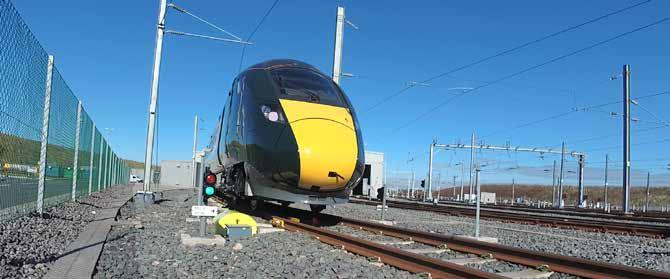62
LIGHT RAIL/METRO
MARK PHILLIPS
West Midlands Metro
e t a d p U
T
he West Midlands Metro system is, right now, in the midst of a major expansion, and it is not letting the coronavirus pandemic stand in its way. In fact, in a subtle way, the virus has brought some small, but surprising, economic and social benefits to the construction process.
The West Midlands Metro has been in operation for just over twenty years now, first opening for passengers in May 1999. The route from Wolverhampton, running south-east to ‘central’ Birmingham for 13 miles and broadly following the corridor of the national rail route from Wolverhampton to Birmingham Snow Hill, saw the return of trams to Birmingham for the first time since their removal in 1953. Initially, ridership was not as high as envisaged at the outset of the scheme proposals. In part, this may have been due to the service terminating at Snow Hill station, which, whilst being convenient for some offices, businesses and shops, is not regarded locally as exactly ‘central’ to the city. Slightly less significant, in terms of motivation of usage, was the fact that the Wolverhampton terminus, St. George’s, whilst in the shopping quarter, was not adjacent to the national rail station. The first of these situations has already been addressed. The Birmingham ‘city centre’ terminus was extended to Grand Central, adjacent to New Street station, with intermediate stops at St. Chad’s, Bull Street and Corporation Street, bringing the tram service further into the city centre. This extension came into use in
May 2016 and annual usage jumped from around 5.0 million passenger journeys per year, first to over 6.0 million and eventually to 8.0 million. At the Wolverhampton end of the route, extending the tram to the main railway station is one of four significant extensions to the Metro which are currently underway: » Birmingham Westside Metro extension » Wolverhampton City Centre Metro extension » Birmingham Eastside Metro extension » Wednesbury to Brierley Hill Metro extension
Rail Engineer | Issue 186 | September/October 2020
Also currently under development and evaluation is the East Birmingham to Solihull Metro extension, which will extend to Birmingham Airport and HS2’s Interchange station, but this proposal is longer term.
Transport Authority and Project Management Funding, ownership, management and operation of the Metro has evolved once or twice since its original creation. Since 2016, these arrangements have stabilised under the authority of Transport for West Midlands (TfWM), which established the Midland Metro Alliance (MMA) to plan, design and build extensions to the West Midlands Metro on its behalf. The MMA consists of the West Midlands Combined Authority, which owns the Metro, a













